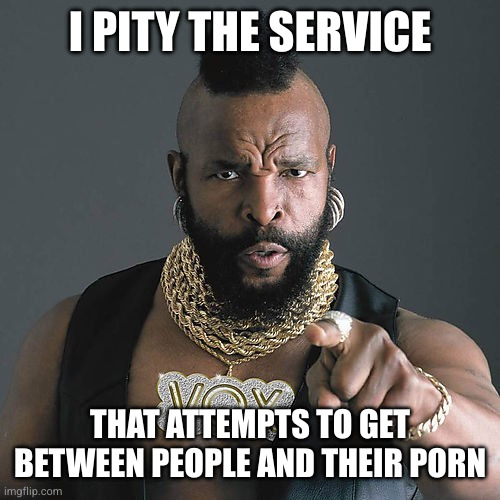- cross-posted to:
- privacy@lemmy.world
- cross-posted to:
- privacy@lemmy.world
This consolidation of power is a dream come true for the Big Tech platforms, but it’s a nightmare for users. While the megacorporations get more traffic and a whole lot more user data (read: profit), users are left with far fewer community options and a bland, corporate surveillance machine instead of a vibrant public sphere. The internet we all fell in love with is a diverse and colorful place, full of innovation, connection, and unique opportunities for self-expression. That internet—our internet—is worth defending.
If I have to verify myself I simply won’t use it, I really don’t care, there’s nothing so important online that I need to prove my identity to see it. (Banking and shit like that aside of course). Social media? Give me a break I’m already over it before all this ID shit. I hope it all burns to the ground.
Same. I know there are easy ways around it but I’m not going to use them, and I wish more people could take this attitude - if everyone cut down their Internet usage in response to this ID stuff things would quickly start to turn around
It would be a big struggle for me but I still agree with you.
this. I refuse to make more accounts, and verify personal info. Ive been prepping for the big disconnect from the internet as a result. there will come a time when it just won’t be usable
Tor and i2p say hello. The internet itself will be totally usable. The clear net is what will become unusable.
But what if they put porn behind a id wall.
I plain feel sorry for the service that attempts to get between people and their porn.
Absolutely never using any service that requires this. I dont even have any account on those platforms and I never will.
I am disinclined to believe that this is a death-sentence for smaller platforms longterm.
Depends on the nature of the platform. It is not good for small commercial entities that will be required to enact a ID verification system because it will increase the cost of entry to the market.
Increasing the cost of entry will benefit large corporations that will easily absorb the cost. Platforms that don’t require it will likely be unaffected.
It is not good for small commercial entities that will be required to enact a ID verification system because it will increase the cost of entry to the market.
As someone who works in this space, I doubt it’s going to be an issue for smaller entities. We already have SSO for basic login identity from a variety of providers (Microsoft, Facebook, Google, Apple) — smaller sites already love to use these as it provides easy access to existing users, and saves a ton of coding for having to handle login information, password management, etc.
These same entities can handle the age verification. Now I can see arguments as to why centralizing logins and age verification like this could be a problem for users, but if I decided to start my own social media app tomorrow I’d likely rely on the big platforms to handle all of this (as we already see everywhere — heck, app for ordering pizza support Facebook, Google, and Apple logins), and save myself the cost and hassle of implementing this myself (never mind the potential embarrassment and liability should someone hack my site). Then it’s on those platforms to worry about age verification.
All of these services are currently free, and save you from a ton of coding around user accounts and authentication, so using them is usually cheaper then having to DIY it.
users are left with far fewer community options
Where is the fediverse in this analysis?
Edit: The article references Bluesky fleeing Mississippi due to risk of fines. Do admins running fediverse instances run similar risks?
Bluesky was the first platform to make the announcement. In a public blogpost, Bluesky condemned H.B. 1126’s broad scope, barriers to innovation, and privacy implications, explaining that the law forces platforms to “make every Mississippi Bluesky user hand over sensitive personal information and undergo age checks to access the site—or risk massive fines.” As Bluesky noted, “This dynamic entrenches existing big tech platforms while stifling the innovation and competition that benefits users.” Instead, Bluesky made the decision to cut off Mississippians entirely until the courts consider whether to overturn the law.
Just goes to show that blue sky isn’t as decentralized as they would like you to think they are.
Hopefully, in the EU at least, the verification will be provided by the government. Like a 2FA, meaning Big Tech would only get a verified token and nothing else.
The government already got passports with our face, and have had it for many years. They could use that information.
That would mean that any platform could implement this verification, and never get hold on any data.
Best case in a shitty scenario, I know.







